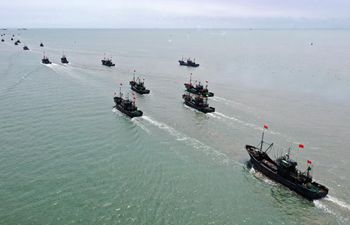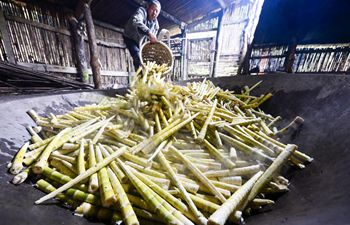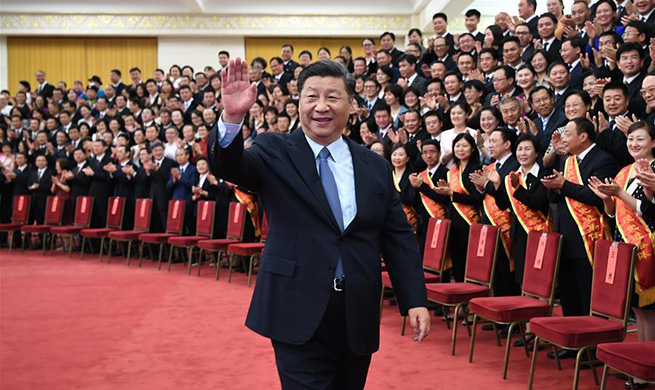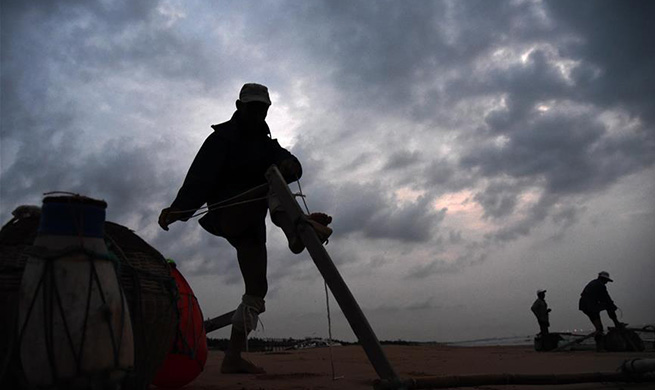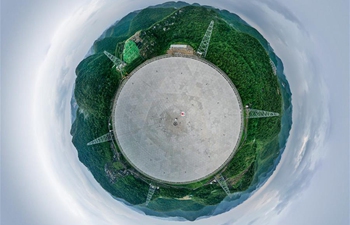BERLIN, Sept. 2 (Xinhua) -- Following the electoral gains over the weekend of the far-right Alternative for Germany (AfD) in the German federal states of Saxony and Brandenburg, industry and employer representatives expressed their concerns for the future of employment and investment in eastern Germany on Monday.
"The relative strength of the AfD in Saxony and Brandenburg increasingly causes us employers concern," said Ingo Kramer, president of the Confederation of German Employers' Associations (BDA).
Kramer warned that the verbal statements made by leading members of the AfD party were "likely to damage the good reputation of the internationally active economy in these federal states."
The minister presidents of Saxony and Brandenburg would now have to form a government "that strengthens the economy and thus improves people's prospects even more," emphasized Kramer.
Joachim Lang, managing director of the Federation of German Industries (BDI), called on the parties to switch "from election campaign to action mode as quickly as possible."
"The CDU (Christian Democratic Union) in Saxony and the SPD (Social Democratic Party) in Brandenburg must begin talks quickly and responsibly about the complicated formation of a government," said Lang.
The AfD achieved its best state election result with 27.5 percent in Saxony and 23.5 percent in Brandenburg in Sunday's elections.
Although the party had missed its hoped-for top position, the AfD had established itself "permanently" as a political force, said the party's top candidate for Brandenburg, Andreas Kalbitz.
In view of the AfD's strong performance, German businesses and economists fear that right-wing populism could become a risk in the east of the country.
"The soaring AfD is a negative factor for east Germany as a business location," said Reint Gropp, president of the Halle Institute for Economic Research (IWH).
Eastern part of Germany is dependent on qualified immigrants and "in the future it will be necessary to counter xenophobia consistently and show openness to the world," noted Gropp.
"Xenophobia, as it is currently fueling the AfD, also discourages investors, prevents new jobs and thus harms the entire region," he cautioned.
According to the German opinion research institute Infratest dimap, 34 percent of AfD voters in Saxony stated that "immigration plays the largest role in my voting decision."
In comparison, only 5 percent of Left Party voters and 2 percent of both SPD and CDU voters agreed with the statement, Infratest dimap found.
Eastern Germany was now "in an explosive predicament as a result of the AfD's success," cautioned Gabriel Felbermayr, president of the Kiel Institute for the World Economy (IfW).
According to Felbermayr, the AfD's economic policy focuses primarily on preserving and protecting the traditional structures of small and medium-sized enterprises and crafts.
"This will neither reverse nor stop the desertification of east German regions," Felbermayr warned.
In contrast, Clemens Fuest, president of the Ifo Institute for Economic Research, predicted that "not much will change directly in the economic policies of the individual states."
This is because the AfD's participation in government has been ruled out by the leaders of most of the political parties.
Saxony's Minister President Michael Kretschmer (CDU) had stressed during the election campaign that the AfD was a party "that is slipping ever further into right-wing extremism."
But Fuest also saw indirect risks, noting that "it could be problematic if investors or skilled workers do not come to east Germany because the AfD is very strong there."
According to Infratest dimap, 70 percent of AfD voters in Brandenburg feel that "east Germans are second-class citizens." In Saxony, the figure is 78 percent.
Hans Peter Wollseifer, president of the German Confederation of Skilled Crafts (ZDH), stated that "only with a clear policy that strengthens the economy and infrastructure will it be possible to regain lost trust" among voters in eastern Germany.
